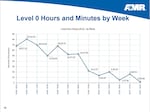AMR, the company that provides ambulance service in Portland and Gresham, says it has nearly eliminated the problem of so-called “level zero” events — when no ambulance is able to respond to a 911 call.
The company provided new data in an update to the Multnomah County Board of Commissioners Thursday.
After a year of trading blame for dangerously slow ambulance service in Oregon’s most populous county, county leaders and AMR executives announced a settlement agreement in August that cleared the way for the company to deploy more ambulances.
The agreement gave AMR three months to complete an overhaul of its service and a hiring push. As of Nov. 1, that ramp-up period is over and the county will require the company to meet standards for speed and staffing or pay fines.
Related: Perspectives on addressing Multnomah County ambulance delays amid staffing woes
AMR says prior to August, it was common for dispatch to be in level zero for 20 to 30 hours a week.
In the final week of October, the amount of time ambulance service was in level zero fell to 26 minutes, according to a presentation from AMR Operations Manager Andrew Cherry.

Compromise measures to improve ambulance staffing have cut the amount of time no ambulances are available when a 9-11 call comes in. Data obtained courtesy of Multnomah County, presented by AMR Operations Manager Andrew Cherry.
AMR
The settlement agreement gave AMR flexibility it had long sought to partner a paramedic with a less trained EMT on some advanced life-support ambulances, a measure the company said was critical to solving its staffing crisis.
It also allows AMR to reduce $7.7 million in fines it racked up in 2023 and 2024 for slow service and non-compliance with its contract, if it meets new performance and staffing targets starting Nov. 1.
Since August, the company has hired 65 EMTs, according to their presentation, with 13 more slated to join in November.
“This has already improved workload for our staff in the field,” said Robert McDonald, Regional Director for AMR Oregon, “with more improvement to come. Multnomah County is returning to a place where paramedics and EMTs can expect to work in an advanced system — that protects them from fatigue and burnout.”
Related: Multnomah County agrees to change ambulance staffing requirements to improve response times
Per requirements in the settlement that it pursue subcontracting and other strategies to bolster the supply of paramedics for the 911 service, AMR has recruited a dozen paramedics from out of state and paid for scholarships to paramedic training programs. The company has also ended some of its work providing first aid at events in the metro area, though it still has contracts with the Moda Center, Portland International Raceway and Providence Park.
Cherry and McDonald’s data showed steady improvements in the speed of service over the last three months, but as of late October, AMR was still falling short of the response times required in its contract with the county: getting to 90% of all life-threatening calls in urban areas within 8 minutes.
The week of Oct. 20-26, AMR’s ambulances arrived to about 80% of life-threatening calls within that time frame.

AMR has been out of compliance since 2022 with a requirement that its ambulances respond to 90% of life-threatening calls within 8 minutes in the urban parts of Multnomah County.
AMR
The county, meanwhile, has created a new public dashboard tracking ambulance response times. There’s about a three month lag in that data.


